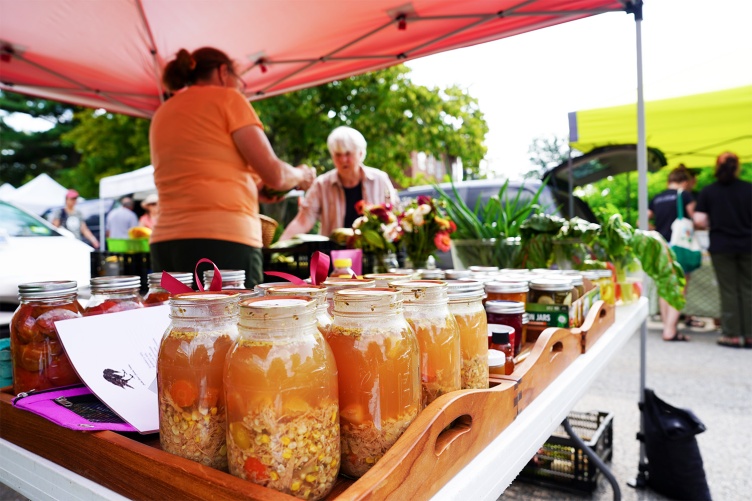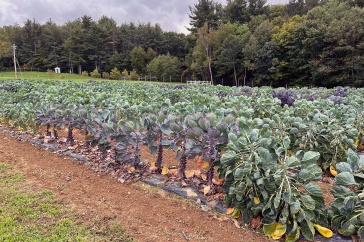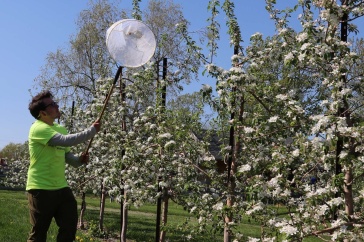
Research led by scientists from the UNH's College of Life Sciences and Agriculture and Carsey School of Public Policy examines consumer views on farmers markets and other alternative food networks.
Key Finding
Alternative Food Networks (AFNs) have struggled to reach beyond a small niche market of committed consumers. While AFNs emphasize local, sustainably grown food sourced directly from small farms, UNH survey results show that attributes like taste, high quality, healthiness, and affordability are more important to most New England consumers than how the food is grown or who grows it.
Previous research shows that people's cultural identity plays a significant role in shaping their food preferences and purchasing behaviors. Earlier work also finds that some consumers view food shopping through AFNs as an expression of their cultural values, creating an emerging cultural identity around values-based food shopping.
Key Term
Alternative Food Network: Alternative food networks (AFNs), including farmers markets and community supported agriculture, are relationship-based marketing models that prioritize shorter supply chains, fair wages for producers, transparency and a commitment to environmental sustainability.
Key characteristics of AFNs: Expand for characteristics
- Local and Regional Focus: AFNs primarily concentrate on supporting local farmers and food producers. They encourage individuals to buy and consume food from nearby areas, reducing the need for long-distance transportation.
- Sustainable Practices: AFNs place a strong emphasis on using environmentally friendly farming methods. They support agroecological ways of growing food that works with natural cycles.
- Fairness and Community: AFNs value fairness and strive to ensure farmers are paid equitably for their efforts. They also strive to serve communities with limited access to fresh and healthy food.
- Different Types of Food: In AFNs, a variety of unique and traditional food types can be found, often not available in regular supermarkets.
- Closer Relationships: AFNs focus on establishing direct connections between people and farmers or food entrepreneurs. This allows consumers to learn where their food comes from and how it's made.
- Taking Control: AFNs aim to empower communities by giving them more control over how their food is produced and shared. They believe people should have the authority to make choices about the food they eat.
From Main Street in a quintessential New Hampshire small town to a busy metropolitan downtown, the vibrant colors and shades of fresh fruit, vegetables and homemade foods and the stylish patterns of handspun clothes and accessories of farmers markets offer a feast for the senses. However, according to research from the New Hampshire Agricultural Experiment Station (NHAES), this “typical” description of a farmers market may not resonate or be experienced in the same way by all consumers. In fact, what consumers seek in a shopping experience and their interest and comfort in visiting a farmers’ market may differ based on shoppers’ ethnic or cultural background, their values, and perceptions of farmers markets.
These differences in perceptions have led to farmers markets being primarily visited by a niche group of repeat shoppers. The practical impact of this to the region’s small and mid-sized farmers and food entrepreneurs—who rely on higher prices by selling directly to consumers—is a narrower customer base that limits their abilities to grow their businesses, according to NHAES scientist Analena Bruce, an assistant professor in the UNH College of Life Sciences and Agriculture, and Jess Carson, a research assistant professor with the UNH Carsey School of Public Policy who are leading the research. This work and its findings are critical to the researchers’ goal of developing more effective marketing models and messaging by alternative food networks (AFNs)—of which farmers’ markets are one type—that appeals to a broader range of consumers and underserved populations who have not previously engaged with local and regional food markets.
“This work is important for reimagining farmers markets and other AFNs in ways that better celebrate and serve the cultural and ethnic diversity that is present and growing in our region,” said Bruce. “At the same time, expanding public participation in AFNs will catalyze local economic development and support food producers and small food businesses that depend on these markets for their survival.”
Surveying Consumers on Farmers Markets & Other AFNs
Although AFNs have gained popularity among committed customers, they have faced challenges reaching a broader population. To determine the extent of these challenges and to begin identifying research-based pathways to overcome them, Bruce, Carson and their research team conducted a survey of over 2,100 consumers located across all six New England states with varying levels of engagement in AFNs. The survey, administered by the UNH Survey Center between November 2022 and March 2023, aimed to explore New Englanders’ food shopping behaviors, values, and perceptions.
Figure 1: Percent of New England Adults Marking Each Characteristic as “Important” in Their Food Purchasing Decisions
Figure 2: New England Adults’ Responses to “Do you think there is a certain type of person who buys local farm foods?”
One important finding was that over 70 percent of New England adults consider attributes such as taste, quality, healthiness, and affordability as important factors when choosing their food (see Figure 1). The results also showed that factors such as locality of food and size of farm vendors were less influential for shoppers than previously thought.
“A surprising finding from the survey is that a little over half of New Englanders say food that supports fair wages and is sustainable and local is important to them, while only a third say it's important that their food was grown on a small or family farm,” described Bruce. “And even fewer—just 21 percent—say it’s important to know the people who grew their food.”
Interestingly, the survey found that some consumers perceived buying from AFNs as an expression of their cultural values. Adults who think of themselves as the “type” of person who buys local farm foods shopped at AFNs at a rate three times higher than those who said they were not the “type” to buy locally. This cultural identity may inadvertently be deterring potential customers who do not feel that shopping at AFNs reflects their values.
“We found that over half of New Englanders think there is a ‘type’ of person [see Figure 2] who buys local farm food, and they’re split on whether they identify themselves as that ‘type,’” said Carson. “We see a relationship between calling oneself the ‘type’ of person who buys local farm food and their reported shopping habits—specifically, whether they buy local foods and from where.”
“We’re still working to unpack these relationships but are seeing signs of connection between identity markers and food acquisition strategies that could be really helpful for understanding less visible barriers to accessing local foods,” she added.
The survey findings showed that even shoppers who said they were not the “type” of person who buys from local farms still occasionally purchased local foods, but these individuals were less likely to shop for local foods at AFNs. The research team is seeking to understand whether AFNs could attract a broader customer base by emphasizing attributes like tasty, high quality and healthy produce and better communicating the benefits of supporting small-scale farms. Incorporating such marketing strategies could help AFNs appeal to a wider audience, benefiting both consumers, who gain access to fresh and sustainable food options, and small-scale farmers, who often rely on these markets to stay in business.
“This work is important for reimagining farmers markets and other AFNs in ways that better celebrate and serve the cultural and ethnic diversity that is present and growing in our region.” ~ Analena Bruce, assistant professor, COLSA
For the next phase of the research, the team is conducting in-depth interviews with a diverse mix of New England consumers who shop and don’t shop at AFNs to further explore the relationships between cultural identity, food shopping practices and perceptions of AFNs.
“This study is important because most of the research that's been done about AFNs focuses on existing customers,” said Bruce, “and this tells us nothing about the perspectives of the general population who currently don’t attend farmers markets, participate in CSAs, or engage in other types of AFNs.”
Interested in reading more about this research? Sign up to receive a printed version of the upcoming INSPIRED Research Report: Food Markets, Nutrition and Community Dynamics—due out early September!
This material is based on work supported by the NH Agricultural Experiment Station through joint funding from the USDA National Institute of Food and Agriculture (under Hatch award number 1024406) and the state of New Hampshire. Support for this research also came from an Interdisciplinary Working Group grant from UNH’s Collaborative Research Excellence (CoRE) initiative and a USDA NIFA AFRI grant under award number 110394.
The research team for this work includes: Analena Bruce, Jess Carson, Hannah Stokes-Ramos, Stephanie Webb, Cindy Zheng, Elise Neidecker, Isaac Leslie, Sarah Boege, Semra Aytur and Larry Hamilton. The team also thanks its advisory committee members Charlene Andersen, Jessica Gorhan, Erin Hale, Ameenah Shabazz, Allan Reetz, and Jennifer Wilhelm for their valuable insights and support of this project.
-
Written By:
Nicholas Gosling '06 | COLSA/NH Agricultural Experiment Station | nicholas.gosling@unh.edu


















































